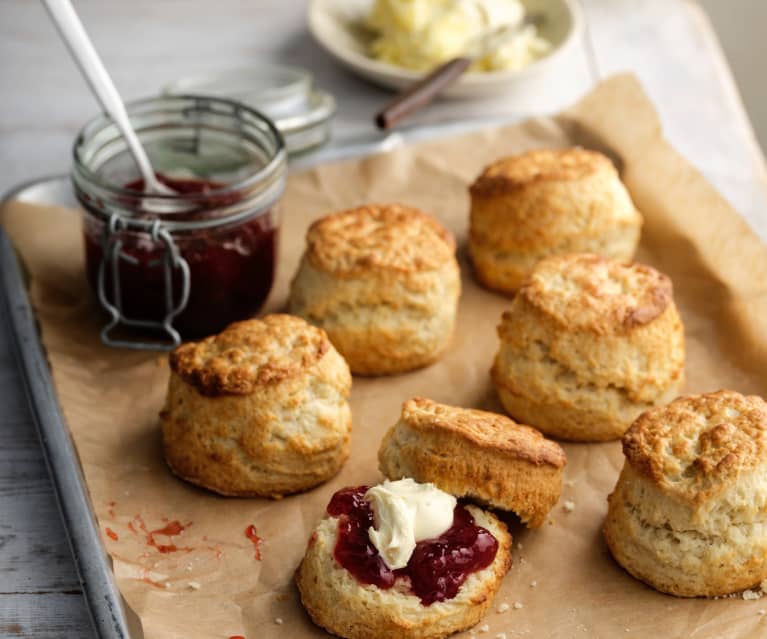Wondering how to make scones? This simple four-ingredient recipe will guide you, plus offer ingredient swaps and pairing ideas
Delicious Four-Ingredient Scones: Easy Recipe with Tips for Everyone

Scones are the perfect treat—quick to make, easy to customize, and loved by many around the world. Originating from the United Kingdom, these delightful baked goods are now a favorite snack for tea time or a light breakfast in countries like the United States and Malaysia.
In this article, we’ll guide you through a simple four-ingredient scone recipe. You’ll also find ingredient substitutions for various regions (including halal options for Malaysian readers), serving ideas, and answers to frequently asked questions.
Simple Four-Ingredient Scone Recipe
These scones are fluffy, buttery, and incredibly easy to make. With just four ingredients, you’ll have a warm batch ready in no time!
Ingredients:
| Ingredient | Quantity (Metric) | Quantity (Imperial) |
|---|---|---|
| Self-Raising Flour | 450 g | 3 cups |
| Cold Butter | 60 g | 1/4 cup |
| Milk | 240 ml | 1 cup |
| Salt | 1/4 teaspoon | 1/4 teaspoon |
Steps to Make Perfect Scones:
- Preheat Your Oven: Set it to 220°C (430°F). Line a baking tray with parchment paper.
- Mix Flour and Butter: In a large bowl, combine self-raising flour and cold butter. Use your fingertips to rub the butter into the flour until it resembles breadcrumbs.
- Add Milk and Salt: Pour the milk into the mixture and add the salt. Stir gently until a soft dough forms. Avoid overmixing!
- Knead the Dough: On a lightly floured surface, knead the dough briefly and pat it into a 2 cm (3/4 inch) thick rectangle.
- Cut the Scones: Use a round cutter to cut out scones. Place them close together on the tray to help them rise evenly.
- Bake: Brush the tops with a little milk for a golden finish. Bake for 12-15 minutes until golden brown.
- Cool and Serve: Let the scones cool slightly, then serve with your favorite toppings.
Ingredient Substitutions for Global Readers
Depending on where you are, some ingredients might not be readily available. Don’t worry—here are easy substitutions!
Self-Raising Flour
- United States: Use 3 cups (360 g) of all-purpose flour, mixed with 4 1/2 teaspoons of baking powder and 3/4 teaspoon of salt.
- Malaysia: Self-raising flour is widely available; brands like Cap Sauh are halal-certified.
- United Kingdom: Self-raising flour is standard in most stores.
Butter
- Halal Options: In Malaysia, use halal-certified butter like SCS or Anchor.
- Non-Dairy Substitute: Replace butter with margarine or plant-based butter for a vegan option.
Milk
- Dairy-Free Options: Swap milk with almond milk, soy milk, or oat milk. Ensure the alternative is unsweetened.
Other Ingredient Additions
Make your scones more exciting with these add-ins:
Sweet Variations
- Add 1/2 cup of dried fruits like raisins, cranberries, or sultanas.
- Mix in 2 tablespoons of sugar for sweeter scones.
Savory Variations
- Stir in 1/2 cup of grated cheddar cheese for a cheesy twist.
- Add chopped herbs like rosemary or chives for a fragrant flavor.
Zesty Kick
- Add the zest of a lemon or orange for a refreshing citrus touch.
Serving Suggestions
Scones are incredibly versatile and can be enjoyed in various ways:
- Traditional Pairing: Serve warm with clotted cream and strawberry jam for an authentic British tea-time experience.
- Simple Butter Spread: High-quality butter and a drizzle of honey make for a quick and delightful topping.
- Savory Pairing: Pair cheese scones with tomato chutney or smoked salmon for a satisfying snack.
- Perfect Beverage: Enjoy scones with tea, coffee, or even a glass of cold milk.
Frequently Asked Questions (FAQs)
1. Can I make scones without self-raising flour?
Yes! Substitute with all-purpose flour, adding 1 1/2 teaspoons of baking powder per cup of flour.
2. Can I freeze scones?
Absolutely! Once cooled, place them in an airtight container or freezer bag. They can be frozen for up to 3 months. To serve, thaw at room temperature and warm in the oven.
3. Why are my scones too dense?
Dense scones are often the result of overmixing the dough or not using cold butter. Work the dough gently and quickly for the best results.
4. Can I make scones without butter?
Yes, you can use margarine, coconut oil, or even Greek yogurt as a substitute for butter. Keep in mind that each will slightly alter the flavor and texture.
5. How long can I store scones?
Store scones in an airtight container at room temperature for up to 2 days. For longer storage, freeze them as described above.
6. Can I add fresh fruits to the dough?
Fresh fruits like blueberries or raspberries can be used, but they may add extra moisture. Pat the fruits dry before adding them, and adjust the flour slightly if needed.
Conclusion
Scones are more than just a snack—they’re a way to bring people together over a warm, comforting treat. Whether you’re in the UK, US, or Malaysia, this recipe offers flexibility and ease, making it accessible to everyone.
Ready to bake? Try this recipe today and enjoy the timeless charm of homemade scones!
